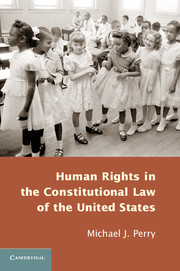Book contents
- Frontmatter
- Dedication
- Contents
- About the Author
- Introduction: Human Rights in the Constitutional Law of the United States
- Part I The Morality of Human Rights
- Part II The Constitutional Morality of the United States
- 4 Capital Punishment
- 5 The Question of Judicial Deference
- 6 The Right to Moral Equality
- 7 The Right to Religious and Moral Freedom
- 8 Same-Sex Marriage
- 9 Abortion
- Concluding Note
- Index
- References
7 - The Right to Religious and Moral Freedom
Published online by Cambridge University Press: 05 July 2013
- Frontmatter
- Dedication
- Contents
- About the Author
- Introduction: Human Rights in the Constitutional Law of the United States
- Part I The Morality of Human Rights
- Part II The Constitutional Morality of the United States
- 4 Capital Punishment
- 5 The Question of Judicial Deference
- 6 The Right to Moral Equality
- 7 The Right to Religious and Moral Freedom
- 8 Same-Sex Marriage
- 9 Abortion
- Concluding Note
- Index
- References
Summary
Religious diversity must be seen as an aspect of the phenomenon of “moral pluralism” with which contemporary democracies have to come to terms…Although the history of the West serves to explain the fixation on religion…the state of contemporary societies requires that we move beyond that fixation and consider how to manage fairly the moral diversity that now characterizes them. The field of application for secular governance has broadened to include all moral, spiritual, and religious options.
– Jocelyn Maclure and Charles TaylorAgain, the two rights that bear most directly on the two large constitutional controversies that are the focus of the next two chapters – same-sex marriage and abortion – are the right to moral equality, which I elaborated in the preceding chapter, and the right to religious and moral freedom, which I elaborate in this chapter.
Jocelyn Maclure and Charles Taylor begin their recent book, Secularism and Freedom of Conscience, by stating that “[o]ne of the most important challenges facing contemporary societies is how to manage moral and religious diversity.” As I am about to explain, establishing and protecting the right to religious and moral freedom – Maclure and Taylor prefer the term “freedom of conscience” – is one of the most important ways for a society to “manage moral and religious diversity.”
- Type
- Chapter
- Information
- Human Rights in the Constitutional Law of the United States , pp. 112 - 135Publisher: Cambridge University PressPrint publication year: 2013

